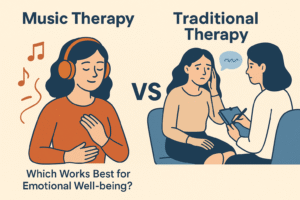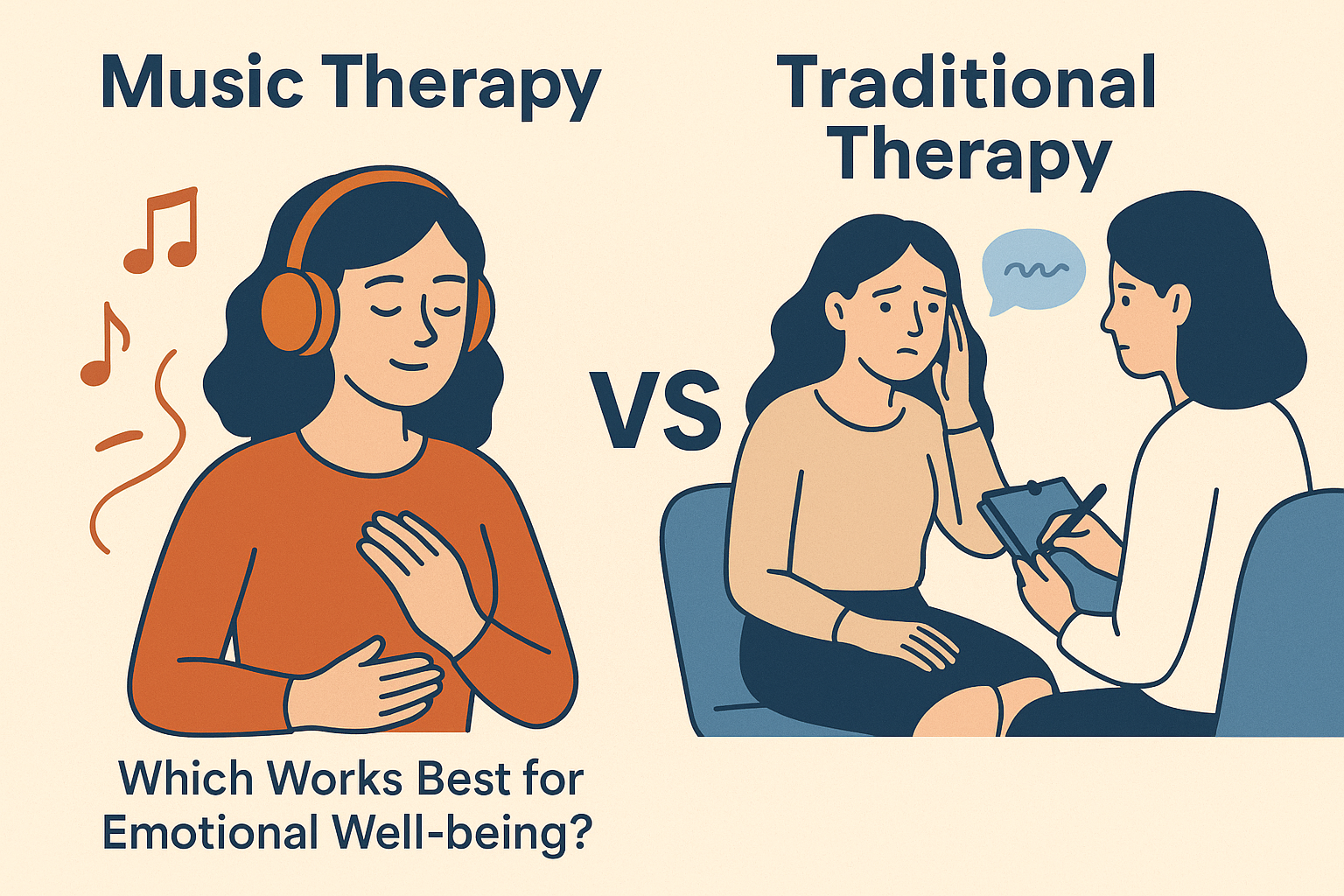Introduction: Understanding Emotional Well-being and Therapy

Emotional stability is not easy to come by in these times. People of all ages, from the youngest to the oldest, are now more frequently and commonly manifesting symptoms of anxiety, depression, or emotional burnout. New Soch Rehab and Psychiatrist Center, an Islamabad rehab centre believes healing is beyond getting rid of a disease; it inspires treatment of the mind and soul besides the body.
Of all the different therapeutic treatments, music therapy and traditional therapy are two powerful treatments that facilitate emotional healing. Between the two, which one is more effective? Let us take a brief look at how these two methods of treatment work towards the sustenance of good emotional health and which one you should opt for.
What Is Music Therapy?
Music Therapy is an evidence-based treatment founded on science and uses sound, rhythm, melody, and instruments to evoke healing. It does not constitute playing one’s favorite tunes-accompanied by a certified therapist in evoking, expressing, or managing emotions through the purposeful use of music.
At New Soch Rehab and Psychiatrist Center, the Islamabad rehab center offers a type of music therapy that facilitates patients suffering from depression or anxiety, trauma victims, and addicts. Music tunes the emotional centers of the brain as it runs several moods for regulation of stress management and better self-realization.
Traditional Therapy: A Time-Tested Approach
Traditional therapy is based on the verbal exchange between the therapist and client. This may be referred to as talk therapy, or psychotherapy. Cognitive behavioral therapy (CBT), dialectical behavior therapy (DBT), and psychodynamic therapies help clients better understand precipitating factors related to emotion and behavior.
It has been applied for decades in psychiatric and rehab centers, also at our Islamabad rehab centre as an approach to the treatment of depression, anxiety, PTSD, and substance use disorders. Patients learn coping mechanisms through structured conversations which can involve self-reflection and healthy ways to manage their thoughts.
Music Therapy vs. Traditional Therapy: A Comparative Analysis
| Aspect | Music Therapy | Traditional Therapy |
|---|---|---|
| Focus | Emotional release through sound and rhythm | Cognitive restructuring through conversation |
| Best For | Emotional expression, trauma, stress reduction | Behavioral change, emotional awareness, mental clarity |
| Approach | Creative, non-verbal | Analytical, verbal |
| Environment | Relaxed and artistic | Clinical and discussion-based |
| Effectiveness | Quick emotional relief | Long-term behavioral improvement |
While each fits a different need, their combination often creates the most effective route to emotional recovery.
How Music Therapy Helps Emotional Healing
Music immediately influences the limbic system of the brain, that area which controls emotion. Used in therapy, it enables patients to:
- Let out hidden feelings: Melody and rhythm permit expression for emotions that cannot be put into words.
- Slow heart rate, low cortisol: Calming music does not always work with everyone but when it gets through, the results are wonderful.
- Raise motivation: Energetic and uplifting music therapy raises the energy of patients, particularly patient motivation as they are recovering from addiction.
- Raise mood regulation: Regular sessions reduce depression and raise the ability to keep emotions steady.
At New Soch Rehab and Psychiatrist Center-the Best Islamabad rehab centre-music therapy improvises session delivery to best suit individual preferences about emotion whether by means of song or instrument playing or guided listening that generally promotes emotional balance and mindfulness.
How Traditional Therapy Supports Emotional Growth
Communication Coping strategies are developed in the process. Clients are guided on how to manage stress successfully. Patients learn how to make their feelings known clearly in any relationship. Resilience gives a strong emotional foundation and builds up over time. Therapy plans are individualized by psychiatrists and clinical psychologists at our rehab centre in Islamabad. The plan helps clients heal from the inside.
Sure. In fact, most advanced rehabilitation centers use both of these techniques. New Soch Rehab and Psychiatrist Center Islamabad also applies them for the emotional treatment of patients.
For example, if an addict wants to throw out her/his emotions with the help of music therapy, she/he can understand the reasons for those emotions with the help of regular therapy. This dual technique helps in quick recovery and sustenance of good emotional health.
The Role of Music Therapy in Addiction Recovery
Music has much to do with the recovery of addicts because through channeling emotion, one comes to realize how to control craving feelings, let go of guilt, and bring back good memories. The Islamabad rehab center uses music therapy to restore emotional strength, create mindfulness, and help creativity build a strong self-identity. This is a non-invasive treatment method that runs parallel with medical treatments and psychotherapies to ensure an all-around plan for recovery.
Who Can Benefit from Music and Traditional Therapy?
Both therapies are beneficial for individuals dealing with:
- Depression or anxiety
- Post-traumatic stress disorder
- Substance use and substance dependence<
- Low self-esteem, or feelings of emotional desolation
- Relationship problems
Our rehabilitation center in Islamabad designs plans of treatment for the variants in the conditions of patients to make them achieve maximum emotional and psychological benefits.
Why Choose New Soch Rehab and Psychiatrist Center Islamabad?
New Soch Rehab and Psychiatrist Center is one among the most trusted Islamabad rehab centers that have earned a reputation for bringing people out emotionally and psychologically stronger. Here’s why we stand out:
- Comprehensive Care: We join the state-of-the-art treatment with artistic methodologies such as music therapy.
- Qualified Experts: Our staff is composed of licensed psychiatrists and psychologists, together with certified music therapists.
- Personalized Treatment: Each therapy plan is customized for every individual.
- Holistic Environment: Wellness of mind, body, and spirit.
Healing is not generic; some take to talking, others take to singing or a melange between the two. This assists one in finding his emotional equilibrium.
FAQs
1. What is music therapy used for?
Music is used for healing emotions and stress and for helping in the recovery process from trauma, addiction, and depression.
2. Is traditional therapy better than music therapy?
No. Both of them are equally effective: while traditional therapy works towards cognitive healing, music therapy works on emotional expression. A combination of both usually works best.
3. Can music therapy help with addiction recovery?
Yes. It allows the patient to bring out suppressed emotions, which slightly reduces craving and develops emotional strength during rehabilitation.
4. How long does therapy take to show results?
The therapy does not take long to show results. It varies from person to person but as a rule, consistent therapy for weeks or months results in improvement.
5. Is music therapy available in Islamabad?
Yes, music therapy is available at New Soch Rehab and Psychiatrist Center, the leading Islamabad rehab centre where we offer both music and traditional therapy options.
6. Is music therapy available for all age groups?
Yes, it does. It works for kids, teens, grown-ups, and old folks too, making this kind of therapy one of the most welcoming.
Conclusion
Music Therapy and Traditional Therapy are important ways to care for feelings. Regular treatment builds mental awareness while music therapy boosts the sharing of emotions. At New Soch Rehab and Psychiatrist Center Islamabad, we mix these methods to offer a custom all-around healing plan that leads to strong emotional recovery and lasting mind health.


